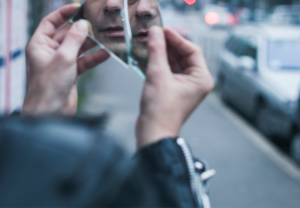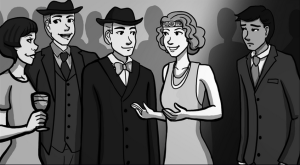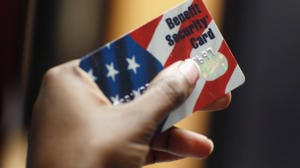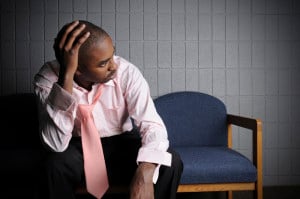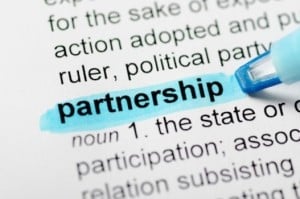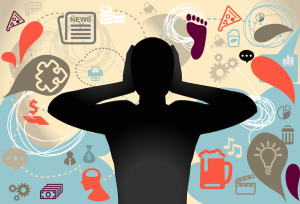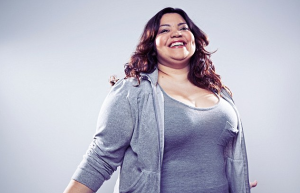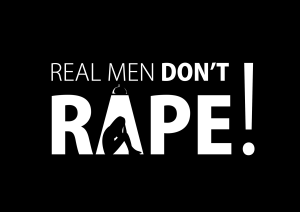Portions of this post were originally published on The Opinioness of the World. Also published on Fem2pt0. It is cross-posted with permission.

Credit: Fem2pt0
(Trigger Warning)
Domestic violence is an issue dear to my heart. I grew up watching my mother in an abusive relationship. I wouldn’t witness one again until I myself was in it.
I debated whether or not to share my own story, to put it out there in the blogosphere. But then I realized it’s not my shame. I did nothing wrong.
People who don’t know this about me may be shocked. I’m a strong, loud-mouthed woman. I’m a proud feminist, advocating for gender equality.
How could this happen to me? And yet to my horror, it did.
I had moved in with my boyfriend — I’ll call him Keith — shortly after I graduated high school. He had always been quiet and attentive. Keith didn’t become violent or even aggressive until we moved in together. When we fought, he became volatile and controlling, not letting me leave the house or allowing me to use the phone.
But it eventually escalated to physical violence. I finally left soon after the first time Keith slapped me. After he moved back in with his parents, I went over their house to pick up a few things he said I had left behind. He became irate and proceeded to throw a bowling ball at my feet. Thankfully I scurried out of the way in time to avoid the assault.
But things were not over yet.
My ex proceeded to stalk me over the next few months. Keith would come to my job, sometimes sitting in the parking lot outside where I worked. Other times, he would come into the store, threatening me. When I told him I was going to call the cops, Keith just laughed, calling me a “little girl.” As I worked late shifts, my protective co-workers would follow me into the parking lot to make sure I got to my car safely.
One night, I was driving home when I saw the familiar headlights of a truck in my rear view mirror. Just to be safe, I passed by my apartment, heading to the police station. Luckily, it either wasn’t Keith or he lost interest and I was able to go home. I moved and changed jobs and didn’t hear from him again.
Years passed and I moved on. Or so I thought.
In my mid-20s, I dated…let’s call him Mark. He was silly, nerdy and sarcastic. We always had fun together. After we had been dating for about a year, we decided to move in together. One night, Mark came home very late and extremely drunk. We began to argue. I was worried and pissed off he hadn’t called to tell me he was running so late.
The next thing I knew, out of nowhere, he punched me in the side of my stomach.
I was shocked. Furious. How could my sweet boyfriend who claimed to love me do this to me? I fought back and pushed him away. This only enraged him further as he proceeded to push me onto the bed. He climbed on top of me. Then he wrapped his hands around my throat, his fingers tightening. Squeezing and choking me. I tried to lift my feet, legs, knees, hands, anything. But his legs and elbows pinned my limbs down, his oppressive weight not allowing me to move beyond squirming.
I couldn’t believe this was happening. I kept thinking over and over, “Oh my god. I have to free myself. I have to get out of here. I can’t die. I can’t die like this.”
Mark finally stopped and then he passed out. I was horrified. He had cracked my ribs. It hurt to laugh or even breathe deeply for a couple months afterwards. But he hadn’t just wounded my body. He had desecrated my trust.
Mark apologized profusely, promising never to drink excessively again. I assumed the alcohol spurred his actions. He wasn’t in control, he didn’t know what he was doing. So I tried to forgive.
But I soon learned Mark’s brutality had nothing to do with alcohol.
A couple months later, we got into another argument. Mark — stone cold sober — picked me up and tossed me on the kitchen floor, like I was nothing more than a rag, a piece of garbage. After my back slammed into the linoleum, he kicked me over and over and over.
I was hurt and embarrassed. I felt humiliated and betrayed. I wanted to leave. Immediately. But I still loved him. And I worried if I could afford rent and my bills on my own. I was moving to a new city in a couple months and he was supposed to move with me.
Right before I moved, I broke up with Mark. I didn’t want him coming with me. I had dealt with his bullshit long enough. I could no longer live in fear.
In both situations, I thought I could fix things, if only I could make the guys better. I put the responsibility on me. While I didn’t believe it was completely my fault, I still thought I played a role, that I instigated the situation by behaving too bitchy or too angry.
Yet I told myself that I wasn’t like other people in abusive relationships because I had high self-esteem. I truly liked who I was as a person. Yet I eventually came to realize that despite my positive opinions of myself, I still had a difficult time envisioning I deserved a loving, supportive partner and relationship.
I finally now know I do.
People often wonder how a woman could let it happen, particularly if there are children in the home. If it happens once, why stay? People who aren’t domestic violence survivors don’t realize it’s just not that simple. Nothing exists in black and white. Everything is shaded grey.
A violent relationship often exists in a cycle. Things go well for a while. Then you start to bicker, arguing turns into fighting, and that’s when physical violence may occur. Then the abuser usually feels guilty, conveying remorse, attempting to make it up to you, swearing he loves you and it will never happen again. This is deemed the “hearts and flowers” phase, when you think “oh he didn’t really mean it, he was “stressed” or “things can change.”
But abuse isn’t merely physical. Abusers often dole out verbal and emotional abuse: controlling your finances, not allowing you to see your friends or family, telling you you’re fat, or ugly or worthless. Some victims stay because they believe their partner or spouse will change. Others desperately want to leave but can’t as they’re bound by financial chains, worried they have nowhere to go. And still others stay for they don’t want anyone to know their dark shameful secret.
Domestic violence is an insidious crisis that affects us all. In the U.S., 1 in 3 women and 1 in 4 men have experienced rape, physical violence, and/or stalking by an intimate partner in their lifetime. The abuser and victim can be of any gender expression, sexual orientation, race, class, size, and strength.
We shouldn’t assume victims lie about domestic violence. Abusers are the ones to blame, not survivors. We need to provide a safe and supportive environment. We never know what goes on behind closed doors. We never know the private pain someone faces.
If you yourself are in an abusive relationship, please talk to someone you trust. Know that love never hurts (not in the physical way), you are stronger than you think and that you are not alone. Shelters and hotlines provide counseling, housing, financial and legal services. They also provide support if you need to prepare an escape plan to leave. Or if you just need someone to listen.
If you happen to know someone in an abusive relationship, as much as you want to, you can’t make them leave. As frustrating as it is, they must leave when they are ready. But what you can do is provide them with love, encouragement and support. When you’re abused, you feel alone. As if no one will understand.
My past trauma created ripples throughout my life. It impacts my world in small and large ways. I don’t like people standing behind me hovering over me. I have an extremely difficult time trusting men. It’s hard for me to be open and vulnerable. The memories may be nebulous shadows. But the pain still stings, haunting me.
Yet each day is a reminder I survived.
Domestic violence can strike any of us: our moms, sisters, best friends and even ourselves. I hope none of you ever have to go through what I did.
But if you do happen to be in an abusive relationship, remember that you deserve better.
You deserve love and respect.
We all do.
Search our 3000+ articles!
Read our articles about:
Our online racial justice training
Used by hundreds of universities, non-profits, and businesses.
Click to learn more






